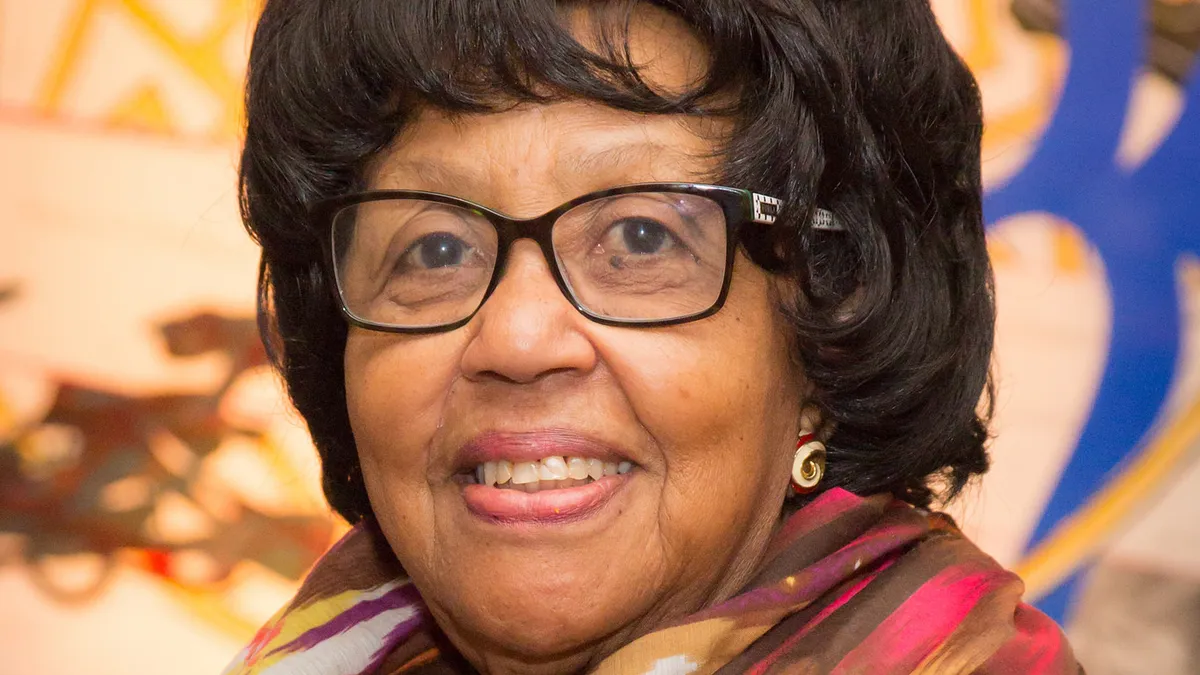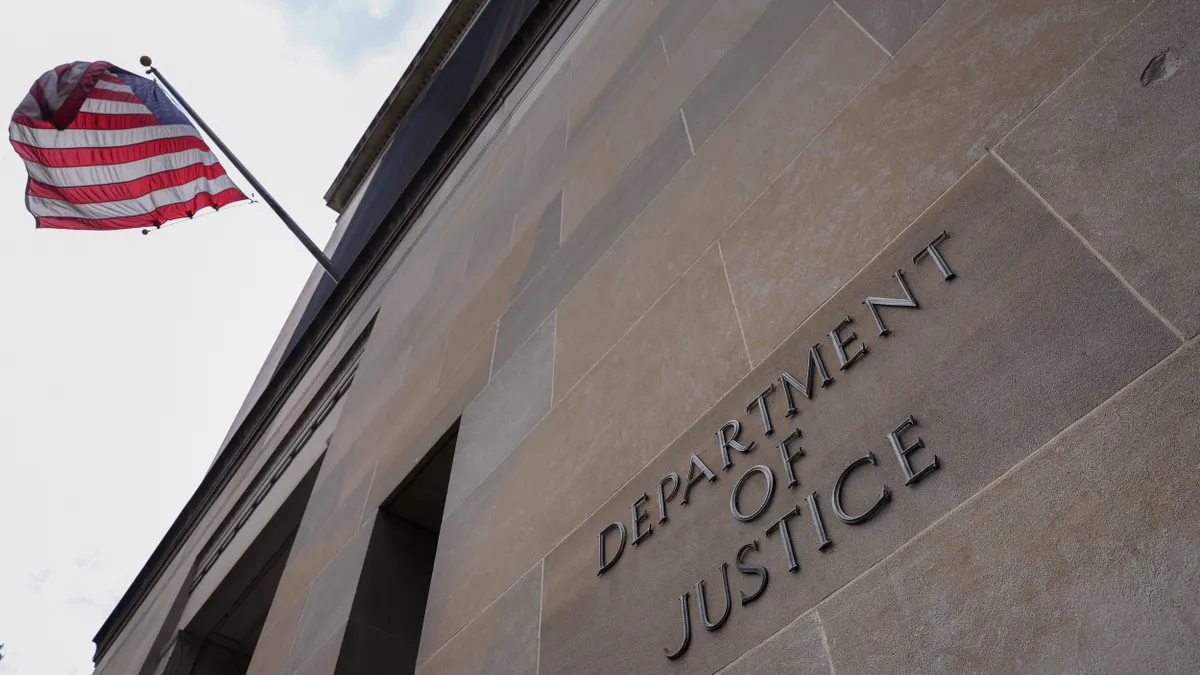To say LaRuth Gray has a wealth of perspective on the times before Brown v. Board of Education through today would be an understatement.
Prior to beginning her seven-decade career in education, Gray grew up as a Black child attending segregated schools in Texarkana, Texas. And she graduated from Howard University in 1954, the year the Supreme Court handed down its momentous Brown decision outlawing racially segregated schools.
Then, after a brief foray into journalism and publishing, Gray found what she considered her true calling: education. She taught English in New York’s New Rochelle City School District, completed a master’s and later earned a doctorate from Columbia University’s Teachers College.
Working her way up the ladder, she eventually became a principal and then assistant superintendent, overseeing the New Rochelle district’s second school reorganization between 1978 and 1983 to address minority isolation and declining enrollment.
Gray served as the first Black woman superintendent of New York’s Abbott Union Free School District from 1983 through 1989. She retired in December 2019 from New York University’s Metropolitan Center for Research on Equity and the Transformation of Schools, where she served as a scholar-in-residence and, prior to that, deputy director.
We recently spoke with Gray to learn more about her experiences growing up in Texas during segregation, how her childhood affected her decision to pursue education as a career, and the impact those experiences had on her approach to leadership.
Editor’s Note: This interview has been edited for brevity and clarity.
K-12 DIVE: From your perspective, what is the legacy of Brown v. Board of Education?
LARUTH GRAY: Brown is responsible for the progress we've made in this country. Brown may be for Black people in America the most important decision that was ever made. Because what it did right then and there in 1954, that decision — forget about how it was implemented — said no longer will Blacks be inherently unequal by law. By law, segregation is inherently unequal by the state.
That then set forth the fact that I could try my dresses on in any store in America. You can ride any bus you want to. I used to ride the train to St. Louis in a separate car. And then when I got to St. Louis, for whatever reason, I could switch to the integrated car. Crazy, right?
In 1950-something, we drove my little Ford … [back] to Texarkana. And I couldn't stop and eat at certain places. I couldn't put gas in the car in certain places.
All of that stopped. All of that's illegal. You can't do it. Out of that comes the Civil Rights Movement.
Brown really set the stage for not making me subjugated under the law. It was about school segregation. I understand that. I get that. But it was much more than that. Much more.
What were your experiences like growing up and going to school in Texarkana during segregation?
GRAY: It's a mixed bag, if you ask me about going to school or my childhood. School was fun. School was always fun for young children. I don't think we understood that we were in segregated schooling.
I think I knew by the time I was in the 8th or 9th grade that it was an education that was not as rich as it needed to be. I think I understood when we got the leftover apples from Texarkana High School at my junior high school. I think I understood when the library was the size of a closet. I think I understood when the superintendent of schools would come to our graduation and he would sleep during the graduation.
I think when I looked at my textbooks, I understood that we did not have the newest textbooks. I think I understood when I had to walk a mile and a half or maybe a little more to get to school. And when we ate our lunch with no lunchroom, I think I also understood all of that.
I'm still convinced that there's a piece missing from one's total humanity if you have to always be separated.

LaRuth Gray
Retired scholar-in-residence, New York University Metropolitan Center for Research on Equity and the Transformation of Schools
My childhood was interesting, because there was that devaluation of us as human beings or me as a person. There was that devaluation of me in so many ways.
But my community was absolutely wonderful.
The principal, for example, of my elementary school used to on Sunday send over to the church the list of the kids who had made As during the week or had done well. So every Sunday morning at church, there was an announcement of who had done what. So that part was excellent.
What else sticks out in your mind from growing up in that era?
GRAY: I think I'll just give you one example, of growing up in Texarkana. And there are lots of stories — when you get to be my age, you just have lots of stories.
I remember I was 12 or 13. I was not the first Rosa Parks, nothing like that. So, I had to get on the bus, put my money in, and then walk to the back of the bus. I just was mad that day. “I don't wanna do that. Why do I have to do this? Why do I have to get on the back of the bus?”
So I got on the bus, and I sat just behind the bus driver. And there I was. He stopped and he said, “Young lady.” He didn't say “girl,” he didn't say “n-----,” he didn't say none of that. I will never forget that as long as I live. He said, “Young lady, you know you are wrong. You know you are wrong.”
I looked to the back of the bus, and I can see it now. The Black people sitting in the back of the bus had their heads down. They didn't say a word. He got up, took my hand and led me to the back of the bus, and then drove off.
I get home, and I tell my mother about it, kind of proud that I had the fight. She told me to go outside and get a switch. Now, I don't know if you know what that means, but in my day, you got a switch, and you got these stings on your legs. And then she said to me, “Don't you ever do anything like that again. You could have been killed. And all those Black people could have been killed.”
That gives you kind of a picture. Then, she said something else to me about a year later that has probably guided me in some ways — I'm not saying negatively necessarily — but she said to me one day, “Don't you worry about those White people. Stop fretting over them. They're ignorant and they're dumb, and you are smarter than they are.”
What a masterful thing she did. Because she didn't say “Hate 'em.” So I'm looking at them and saying, “You’ve got the problem. I ain't got the problem. I'm fine.” And to some extent, that has actually been my pathway. “I'm good. I'm fine. I am not a victim. You are the problem. I'm not the problem.” And that kind of stays with the way I operate.
How did those experiences shape your perceptions of education growing up?
GRAY: I'm convinced — when I was growing up, when I was at Columbia, when I was teaching, when I was a principal — that school experiences have to involve students working and playing together. I'm convinced separation is never good.
I'm still convinced that there's a piece missing from one's total humanity if you have to always be separated. I'm convinced that segregated school — whether it's the top segregated school in the country, and all the Black kids are going to Harvard from that segregated school — that there's something that still does not yield a society that can be whole.
What impact did growing up in Texarkana during segregation have on your decision to pursue education as a profession?
GRAY: I was always interested in the human side of who we were. That's really what Texarkana did to me, because I saw lots of stories — but I could see that there were decent White people, if that's the fair thing to say.
In the Italian grocery store that abutted the Black streets, I would go in there after school when we walked back from what I call the creek, and I would charge a peanut patty or whatever it was, and my mother would pay the bill on Saturday. There was a young White girl there who was my age, and she would go to the [White-only] library and get books for me. The librarian knew who I was, and she'd send me books through that young woman.
So my experience was that we have to work to make school a place where, yes, we learn — but there's a very human side to all of this.
How was your approach to leadership affected by that?
GRAY: What I'm suggesting to you is that my way of leading has always been to move for integrated common experiences in everything I've ever done, so that's how it shaped me.
Do I think you can have a quality school — notice how I said this, I was trying to be very clear — in terms of academia at an all-Black school or an all-Latin school? Probably. But that's not what makes our humanity strong and consistent and anchored. We need experiences beyond ourselves, beyond our tribes, beyond our whatever. That's what I think.





















